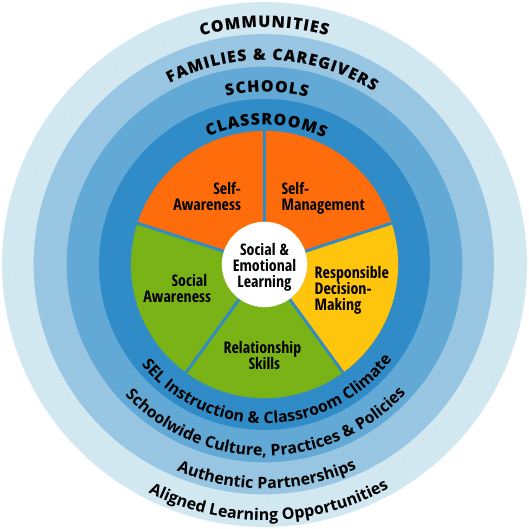by Theresa Powers, Program Director
I am pleased to share the news that MSSA has embarked upon a new initiative this school year to establish a shared vision around and ongoing practices for social and emotional learning, commonly known as SEL. SEL cultivates competencies and skills that advance student learning and development, and it helps children better cope with everyday challenges as they develop the self-awareness, self-control, and social skills that are vital for school, work, and life success.
There is a lot of overlap in Montessori philosophy with SEL competencies, as Dr. Maria Montessori was a pioneer in understanding the whole child and not just focusing on their cognitive abilities. The key Montessori tenets of “care of self,” “care of others,” and “care of environment,” line up with SEL’s focus on interpersonal skills and social skills.
To kick off the year, all faculty took part in a SEL Inservice workshop, where they were introduced to the Collaborative for Academic, Social, and Emotional Learning’s (CASEL’s) Framework for SEL, which specifically defines five areas of social and emotional competence and four key settings, as illustrated in the “CASEL wheel.” An overview of SEL from CASEL is available here: https://youtu.be/ouXhi_CfBVg
There has been an explosion in research in the past twenty years about how our brains work and how we learn. Neuroscience confirms that our emotions and intellect operate in partnership and that what our senses take in must pass through our emotional filters before entering long-term cognitive storage. This confirms something many of us have come to know through experience, which is that how we feel has an impact on how and what we learn.
Although the SEL competencies sound good, you may be wondering how SEL is taught in schools. SEL happens in essentially three ways: specific SEL skills can be taught, SEL practices can be incorporated into classroom settings, and an SEL climate can be promoted in schools. An example of teaching a specific SEL skill would be anytime we have asked a child to take a breath and then demonstrated and done it with them. As we help children learn new vocabulary naming feelings, they are better able to communicate and manage their feelings. An example of a classroom practice is the community circle; we have many circles at MSSA, and these circles allow children to practice listening as they take turns and sit in community. School-wide promotion of SEL includes greetings and programs that promote good decision-making, as well as family events that build community.
Seventeen faculty members from all divisions have joined our new SEL Committee, and we are currently working on crafting a SEL vision for our school. We will continue to learn about SEL and make plans to promote SEL as a shared language at MSSA as we incorporate SEL practices. We expect to eventually grow the committee to include parents and students, and we will continue to share our process and what we are learning.

